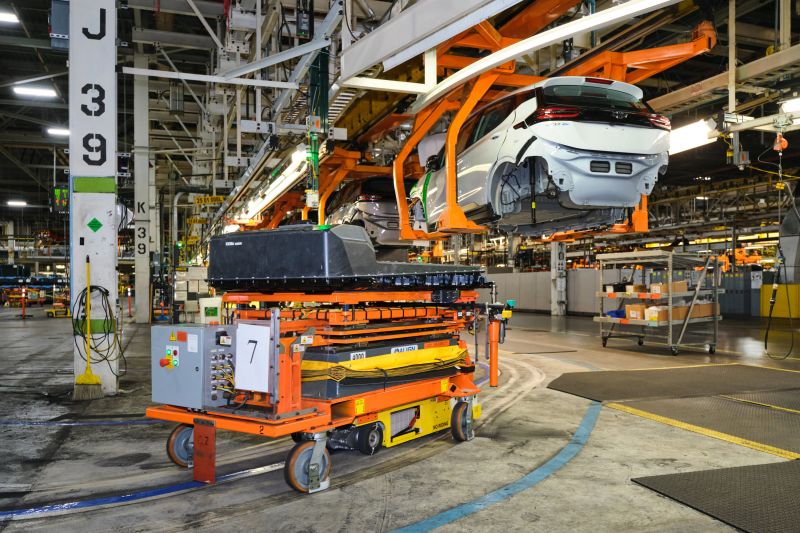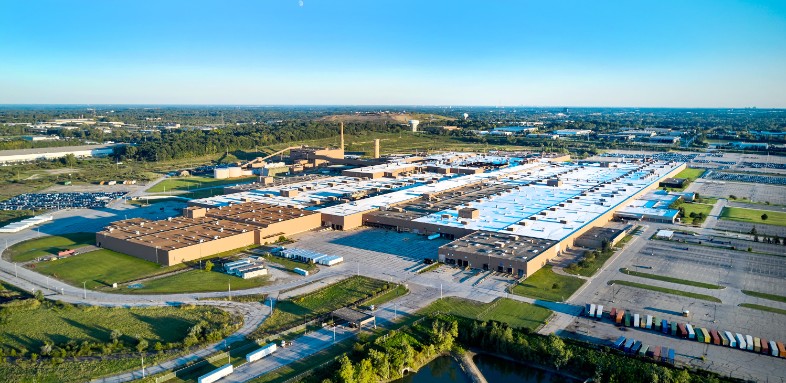General Motors is Investing $7 Billion to Build EVs in Michigan, the Largest Manufacturing Commitment in the Company's History
【Summary】GM announced today its investing more than $7 billion in four Michigan manufacturing sites to build electric vehicles and batteries. The massive investment will significantly increase GM’s production capacity for electric vehicles. The $7 billion investment is the single largest investment announcement in automaker's 100+ year history.

Automaker General Motors announced today its investing more than $7 billion in four Michigan manufacturing sites to build electric vehicles and batteries, which will create 4,000 new jobs as the automaker transitions to becoming an electric automaker. The massive investment will significantly increase GM's production capacity for electric vehicles.
The $7 billion investment is the single largest investment announcement in GM's 100+ year history. It includes $4 billion to construct a new Ultium Cells battery cell plant in Lansing and the conversion of GM's assembly plant in Orion Township, Michigan for production of the electric Chevrolet Silverado pickup and electric GMC Sierra.
Production of the Silverado EV and electric Sierra, will begin at Orion in 2024.
With the new investments, GM said its EV production volumes will increase dramatically over the next 5 years. The automaker says its will be able to produce 600,000 electric trucks a year in Michigan by the end of 2025. Site work will begin immediately, GM said.
"It will make our home state the epicenter of the electric auto industry," said GM CEO Marry Barra.
By the end of 2025, GM said it will have more than 1 million units of electric vehicle capacity in North America across the three facilities to respond to growing electric vehicle demand.
The Orion assembly plant investments also include new body and paint shops and new general assembly and battery pack assembly areas.
Orion Assembly will become GM's third U.S. assembly plant that's being transformed for production of Ultium-powered EVs. GM other assembly plants in North America currently building, or being converted to build EVs, include Factory ZERO in Detroit and Hamtramck, Michigan; Spring Hill Assembly in Spring Hill, Tennessee.
The Spring Hill plant is building the forthcoming electric Cadillac Lyriq SUV and Factory Zero is building the new Hummer EV.
GM is also making a $2.6 billion investment to build a third Ultium Cells EV battery cell plant in Lansing, Michigan with its joint venture partner LG Energy Solution. The investment is expected to create more than 1,700 new jobs once the plant is fully operational.
The new battery plant being built in Michigan follows the Ultium Cells battery cell manufacturing plants under construction in Ohio and Tennessee.
Site preparations on the battery plant will begin this summer and battery cell production is scheduled to begin in late 2024. The 2.8 million sq ft Ultium Cells factory in Lansing will supply battery cells to GM's Orion Assembly and other plants.
"Today we are taking the next step in our continuous work to establish GM's EV leadership by making investments in our vertically integrated battery production in the U.S., and our North American EV production capacity," said Barra. "Our plan creates the broadest EV portfolio of any automaker and further solidifies our path toward U.S. EV leadership by mid-decade."
GM is also investing $510 million in two Lansing-area vehicle assembly plants to upgrade the production capabilities for near-term combustion engine powered vehicles. GM's Lansing Delta Township Assembly will produce the next-generation Chevrolet Traverse and Buick Enclave SUVs, while the company's Lansing Grand River Assembly will get upgrades to modernize the facility for future vehicle production.
Vertically integrating battery assembly and converting existing assembly plants to build EVs are at the core of GM's strategy for scaling production in North America as its looks to catch up to industry leader Tesla. GM projects it will convert 50% of its North American assembly capacity to EV production by 2030.

GM's assembly plant in Orion Township, Michigan is being converted to produce the Chevrolet Silverado EV & electric GMC Sierra.
GM's Recent Investments in Joint Venture Partnerships
To support GM's transition to building more EVs, the automaker recently has made a series of new investments to build a new supply chain via strategic supplier agreements for batteries and EV components. The supply chain is expected to be scalable, more resilient, more sustainable and more North American-focused, according to GM.
Among these strategic supplier agreements is a joint venture partnership with German company Vacuumschmelze (VAC) to build a U.S. factory that will manufacture permanent magnets for the electric motors for GM's future electric vehicles. VAC is a leading manufacturer of magnetic alloys.
GM also formed a joint venture partnership with South Korean battery materials company POSCO to construct a factory in North America to process battery materials for the automaker's Ultium electric vehicle platform, which will underpin future GM models.
The joint venture will process what's called "Cathode Active Material" or CAM, which is a key battery material. CAM represents about 40 percent of the cost of a battery cell, according to GM.
In Oct 2021, GM announced a strategic supplier agreement with North Carolina-based semiconductor company Wolfspeed Inc. to develop and provide silicon carbide (SiC) power solutions for GM's future electric vehicles.
GM said it will participate in the "Wolfspeed Assurance of Supply Program" (WS AoSP), which is intended to secure domestic, sustainable and scalable materials for EV production.
The silicon carbide technology supplied by Wolfspeed will be used in the integrated power electronics of GM's new Ultium Drive units that will be used to power the company's next-generation EVs.
Silicon carbide has benefits over traditional silicon chips, including better conductivity and cooling performance in high temperature environments, which makes them well suited for GM's future electric vehicles.
GM plans to introduce 30 all-new EVs globally through 2025, two-thirds of which will be available to customers in North America. In June of last year, GM announced that its increasing its investments in electrification and autonomous driving technologies to $35 billion through 2025 as it plans for an all-electric future with dozens of new battery-powered models in the works, many with autonomous driving capability.
The automaker's new $7 billion investment in EVs and batteries announced today will help ensure that GM can reach its goal.
-


Ford is Testing a New Robotic Charging Station to Assist Drivers of EVs With Disabilities
-


Ford Raises the Prices of the F-150 Lightning Electric Pickup Due to Rising Raw Material Costs
-


The BMW 7-Series to Feature HD Live Maps From HERE Technologies for Hands-Free Highway Driving in North America at Speeds up to 80 MPH
-


AutoX to Use the 'Eyeonic Vision Sensor' from California-based SiLC Technologies for its Robotaxi Fleet in China
-


LG Develops ‘Invisible’ Speaker Sound Technology That Could Revolutionize In-Vehicle Audio
-


Researchers at South Korea’s Chung-Ang University Develop a ‘Meta-Reinforcement’ Machine Learning Algorithm for Traffic Lights to Improve Vehicle Throughput
-


Zeekr’s New 009 Electric Passenger Van is the World’s First EV to Feature CATL’s Advanced ‘Qilin’ Battery With a Range of 510 Miles
-


Redwood Materials is Building an Electric Vehicle Battery Recycling Facility in South Carolina
- Mercedes-Benz Begins Production of the Highly Anticipated EQS Electric SUV in Alabama
- Intel’s Self-Driving Car Unit Mobileye Postpones its Planned U.S. IPO That Could Value the Company up to $50 Billion
- Rivian is Laying Off 6% of its Workforce, Citing Erratic Economy
- Tesla's Battery Supplier CATL Unveils its New ‘Qilin’ Battery That Can Deliver 600+ Miles of Range to EVs
- Lucid’s New ‘Stealth Look’ Appearance Package for the Electric Air Sedan Compliments its High Performance DNA
- Researchers at South Korea’s Chung-Ang University Develop a ‘Meta-Reinforcement’ Machine Learning Algorithm for Traffic Lights to Improve Vehicle Throughput
- Automaker BYD is Emerging as One of Tesla’s Biggest Competitors in China, Latest Vehicle Registration Data Shows
- Volkswagen CEO Believes It Will Overtake Tesla in EV Sales by 2025
- Good Time to Buy Into China's EV Industry
- Biden Administration Announces New Standards to Make EV Chargers More Accessible











 About Us
About Us Contact Us
Contact Us Careers
Careers